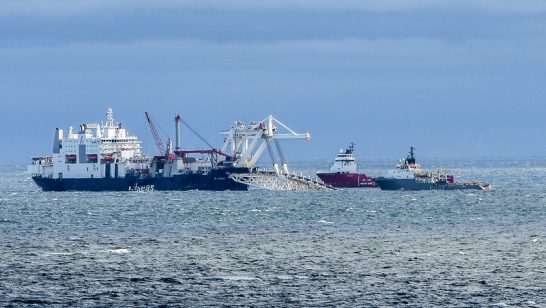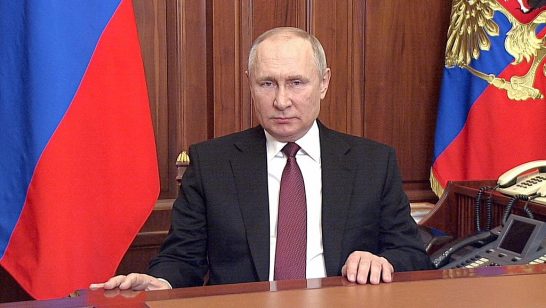
Convening in London this week, the G7 foreign ministers expressed their interest in standing together in the face of a variety of challenges, including how to engage with Russia and China. After four years of bombastic tweets and erratic declarations from Donald Trump, the first 100 days of the Biden presidency have shown that the new US president is more willing to work with European allies than his predecessor was. Yet this does not mean that all is well for the transatlantic alliance. For one, Mr Biden looks keen to impose more sanctions on Russia at a time when most of Europe appears reluctant to go down that road, paving the way for US-EU disputes on sanctions. Such rows are dangerous: they foster the emergence of cracks in the transatlantic partnership, to the benefit of the Kremlin.
Over the past few decades, sanctions have become Washington’s default tool to advance US foreign- policy goals. An eclectic assortment of countries, including Cuba, North Korea, Iran, Syria, Russia, Venezuela and Turkey are currently under some sort of American penalties. In April the Biden administration announced a new round of sanctions against Russia with great fanfare. These new measures did not come as a surprise; in Washington’s corridors of power the anti-Russia consensus is strong and bipartisan. As a result, Mr Biden has chosen to adopt a hawkish stance against Moscow from day one.
Most European policymakers share Washington’s worries about Russia. Over the past decade, the Kremlin’s strategy has centred on bolstering Russia’s presence on the global stage at all costs, even if this means illegally annexing a chunk of Ukraine’s territory, supporting the brutal regime of Bashar al-Assad in Syria, and waging cyberattacks against American interests. More recently, the poisoning of Russian opposition leader Alekseï Navalny, a (mysterious) build up of Russian troops near the Ukrainian border, and concerns around the construction of the Nord Stream 2 gas pipeline have further fuelled tensions with Moscow. Many EU member states care deeply about these issues and are keen to co-operate with the US to address them. However, this does not mean that Europe would be on board for more sanctions on Russia.
For better or for worse, the mood in Europe is mostly for softening Russia sanctions, or at least not imposing new ones. There are ups and downs in the road, but after seven years of sanctioning Russia—arguably for meagre results given Russia’s latest actions—many European capitals are keen to explore ways to restore ties with Moscow. France’s president Emmanuel Macron leads the way. In his view, isolating Russia is a mistake, as it pushes Moscow closer towards Beijing. Pragmatic considerations also explain the reluctance of some EU countries, notably Germany, to impose more sanctions against Russia; many European firms have a strong presence in Russia and Moscow supplies roughly one-third of the EU’s oil and gas imports.
Even if Europe were on board for more sanctions, their substance would be a matter of debate. For the EU, US sanctions represent a serious headache: unlike European ones, American sanctions are extra-territorial. This means that every company around the world that uses the US dollar or has ties to the US must respect American sanctions or face the risk of falling under sanctions themselves. Over the past years, European companies have often found themselves caught in the crossfire of US sanctions. French energy company Total had to ditch a multibillion-dollar project in Iran after Mr Trump pulled out of the nuclear deal in 2018. In the same year, US sanctions against Russian aluminium giant Rusal derailed global commodities markets, threatening to put thousands of people out of work across the globe. More recently, firms involved in the construction of the Nord Stream 2 pipeline are facing tough times; the threat of US sanctions has prompted dozens of European companies to stop working on the project.
The side effects of US extra-territorial sanctions on European firms have long been a serious irritant in the US-EU relations. Many EU member states believe that the US takes things one step too far with extra-territorial sanctions, infringing Europe’s sovereignty. In turn, transatlantic tensions over US sanctions make progress on (more effective) joint US-EU sanctions on Russia unlikely. This situation also explains why the mood across European capitals is all about “strategic sovereignty”: this is a polite way to discuss shielding European companies from US sanctions.
New unilateral American measures against Russia would be risky for the transatlantic alliance. They would make the US-EU unity on sanctions against Russia that prevailed in 2014 only a distant memory. Agathe Demarais
If US sanctions were to get a whole lot worse, EU firms might even have to exit the Russian market. This would fuel resentment against the US across European capitals and give new urgency to EU plans to shield the bloc from American extra-territorial sanctions. In the long term, the emergence of such mechanisms could seriously dent the effectiveness of US sanctions, depriving Washington of one of its favourite economic weapons.
A clash between Washington and Brussels over what to do with Russia would be good news for the Kremlin. As long as both sides of the transatlantic partnership argue about sanctions, much-needed co-operation on how to tackle Moscow’s aggressive actions will be difficult. Such tensions also make sanctions less powerful; experience shows that multilateral penalties tend to be much more effective than unilateral ones. This is especially the case when it comes to Russia-related measures. The legacy of the Cold War means that Russia has traditionally had few economic ties to the US, limiting the bite of American sanctions. By contrast, Moscow knows full well that the Russian economy would be in a dire state if European sanctions were to cut trade, investment and financial ties to the EU.
As the Biden administration plans to conduct a comprehensive review of its sanctions policy, transatlantic discussions on sanctions are a necessary first step. Such talks are urgently needed to defuse US-EU tensions. At the very least, they would help Washington to see potential sanctions on Russia from Europe’s perspective and enable EU member states to voice their concerns around the side effects of US sanctions. The importance of such talks cannot be overstated: the stakes with Russia are sky-high and the transatlantic partnership is already under too much strain to cope with more sanctions disputes.
The opinions articulated above represent the views of the author, and do not necessarily reflect the position of the European Leadership Network (ELN) or any of the ELN’s members. The ELN’s aim is to encourage debates that will help develop Europe’s capacity to address pressing foreign, defence, and security challenges.
Image: Flickr, OpenDemocracy



